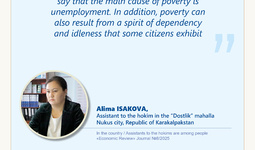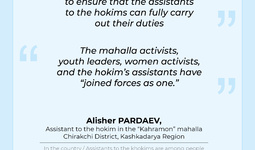– Tell us about your professional career and how you came to this position. What skills help you perform your duties effectively?
– Since March 28, 2023, I have been working as the assistant to the khokim of the “Shovana” mahalla in Koshrabad district. Prior to that, I worked at the khokimiyat of Payaryk district. I also have experience working in a private accounting firm. My background in accounting significantly helps me perform my duties efficiently today, as accurate calculations positively impact the effectiveness of work in any field. I was appointed as khokim’s assistant through an open competition, having passed both a written test and an interview.
– Tell us more about the location of the mahalla and the employment opportunities for its residents.
– Our mahalla “Shovana” is located in the Koshrabad district. The main economic driver of the mahalla is viticulture — 90% of residents grow grapes in their household plots, mainly for drying and selling raisins. Thanks to our favorable location, the service sector is also well developed. Our mahalla has 4 general education schools, 1 state and 3 family-run kindergartens, 1 family medical center, and 3 industrial enterprises.
– What have you achieved in your first year in this position?
– In the beginning, I often asked myself what more could be done to improve the living standards of the population. After a thorough study of the area and discussions with local activists and entrepreneurs, I became convinced that the mahalla has potential for developing other types of entrepreneurship. We worked on organizing new roadside service points and modernizing the existing ones. We also successfully introduced and expanded meat poultry farming and beekeeping in the region.
– Tell us in detail about the results of your work in 2024. What do you consider your most important contribution to society last year?
– The year 2024 was truly unforgettable for the residents of our remote mahalla and for me personally. Last year, our mahalla was included in the “Obod Mahalla” program, under which large-scale landscaping and construction efforts were carried out to remove it from the category of “underdeveloped areas,” improve infrastructure, and raise the standard of living.
As part of the program, around 1,000 houses were renovated, 500 damaged utility poles were replaced with reinforced concrete ones, 18 km of power lines were laid, 4 broken transformers were replaced with new ones, and 9 more were fully repaired. A new asphalt pavement was laid between the 9th and 15th kilometers of road Miton–Koshrabod–Nurata that passes through the mahalla. Street lighting was installed along the roadside, and a 4 km pedestrian walkway was built to ensure pedestrian safety. A new modern mahalla building and a library were constructed in place of the old facility. The family health clinic, 12 kindergartens, and the buildings of schools No. 8, 9, 16, and 35 were all renovated. In the center of the mahalla, we established a “Nuroniylar Maskani” (center for elders), a sewing workshop, and a small market.
To support low-income families, the houses of eight most vulnerable families were fully renovated. Through sponsorships, each of 50 low-income families received 50 chickens — totaling 2,500 birds. To ensure a sustainable source of income for mahalla residents, 40 unemployed citizens were allocated 20 hectares of land for farming. Two artesian wells were drilled there, creating favorable conditions for 40 families to engage in agriculture.
Along the main road, 15 service and trade points were built, creating 30 new jobs. Additionally, 150 citizens received preferential loans totaling 3.5 billion sums for projects in livestock, poultry farming, tailoring, service provision, agriculture, handicrafts, and other fields. Extensive support was provided to help them start their own businesses.
– Several resolutions concerning the duties of hokim assistants were adopted in 2023. What changes were made in your mahalla in this context, how has the work of the new team been organized, and has this improved your effectiveness?
– Certainly, these resolutions and decrees have further increased attention to the mahallas. I believe the addition of a social worker and a tax inspector has strengthened our ability to work more individually with the population. Thanks to social workers, we are now better able to identify and support families in need of social assistance. The tax inspector’s involvement has improved local budget revenues, and the establishment and legalization of new business entities have positively impacted our activities.
– What are the key priorities for the development of your mahalla this year? What has already been accomplished?
– This year, our main priorities are poverty reduction, transforming our mahalla into a zone free from unemployment, further development of entrepreneurship, and comprehensive support for local entrepreneurs. To achieve these goals, we developed an individual plan for every low-income family. Based on this plan, we have already provided stable employment to 10 out of 61 low-income families and issued preferential loans to another 12. We also trained five family members in vocational skills and entrepreneurship, and we continue to implement this plan.
Full version is available here.
Jamoliddin Turdimov, CERR
"Economic Review" Journal №6/2025





















leave a comment